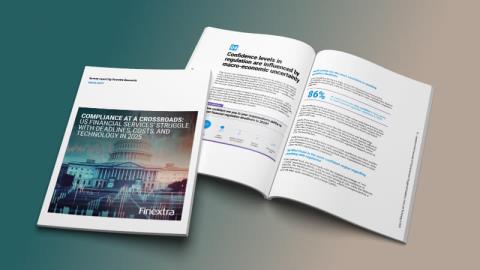Navigating Compliance Challenges: Insights from Finextra Survey on Technology Gaps Amid US Regulatory Uncertainty
In the ever-evolving landscape of regulatory compliance, the recent survey reveals a surprising level of regulatory confidence among financial institutions. A remarkable 96% of participants expressed feeling either ‘very confident’ or ‘quite confident’ in their ability to meet compliance deadlines by 2025. However, this optimism coexists with the challenges posed by a complex regulatory environment, particularly regarding data security.
Understanding the Impact of Data Security Regulations
Data security regulations are becoming increasingly vital as concerns over cybersecurity grow. Among survey respondents, 26% of banks identified the Bank Data Security Act as the most influential regulation for the upcoming year, underscoring the urgency of protecting sensitive financial information amidst rising cyber threats.
Technology Adoption: A Double-Edged Sword
Technology plays a crucial role in ensuring compliance, with 72% of respondents utilizing data analytics and 66% employing AI to meet regulatory requirements. This shift toward data-driven decision-making is viewed positively by the industry as financial institutions strive to enhance their compliance processes. However, the survey highlights alarming gaps in technological capabilities:
- A mere 3% of respondents believe their current technology stack fully meets their compliance needs.
- Many institutions are struggling to effectively integrate and leverage technology to manage compliance risks.
Barriers to Compliance: Cost, Complexity, and Talent Shortages
The survey also sheds light on the numerous barriers financial services firms face in achieving compliance:
- 36% of participants cited high compliance costs as their primary concern.
- Nearly 46% expect to allocate 8-10% of their EBITDA to compliance efforts by 2025, indicating significant financial strain.
- 25% mentioned differentiated compliance requirements as a major challenge due to the intricate regulatory environment.
- Half of the organizations reported difficulties in finding the right talent to navigate the fluidity of regulatory changes.
Collaboration and Third-Party Partnerships on the Rise
A notable 73% of organizations are collaborating with third-party vendors or consultants to effectively manage regulatory changes. This trend signifies a broader shift towards teamwork and external expertise in the financial sector. Remarkably, only 6% of organizations are not considering third-party partnerships, indicating a widespread acknowledgment of the need for additional resources to tackle compliance challenges.
Highlighting Credit Unions and Community Banks
The survey also placed emphasis on credit unions, often underrepresented in financial services research. Their inclusion highlights their crucial role in promoting financial inclusion and supporting consumers and small businesses. This data provides valuable insights for both fintech and traditional financial institutions regarding how credit unions are shaping the regulatory landscape, especially in relation to their ties with Community Development Financial Institutions (CDFIs).
Looking Ahead: A Changing Regulatory Landscape
As regulatory changes loom and uncertainty persists regarding the Trump Administration’s deregulation approach, the financial services sector stands at a pivotal moment. While confidence remains high for meeting compliance deadlines in 2025, organizations must address key challenges related to costs, technology adoption, and talent acquisition.
Financial institutions must adapt by integrating technology, fostering third-party partnerships, and gaining a deeper understanding of the unique contribution of credit unions within the financial ecosystem. This may require a reassessment of risk management frameworks and investments in innovative technologies to navigate an increasingly intricate regulatory environment.
The insights from Finextra’s survey offer a critical roadmap for financial institutions aiming to refine their compliance strategies and prepare for the challenges that lie ahead in 2025. Curious for more insights? Download the full report here.







